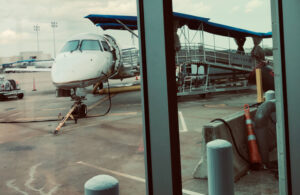
Photo by John Griswold
My friend Larry was complaining that his flight to Paris was several hours longer, now that he lived in Los Angeles instead of Chicago.
“That means I have to watch three or four more movies in-flight,” he said. He is an actor.
I had just driven 13 hours from Louisiana, dropped my car in the cheapest remote lot at the St. Louis airport, caught a clattering shuttle over potholed roads to the terminal, and was in Houston, waiting on the second leg of my flight, so I could do it all over again, this time driving a moving truck.
He chided me for thinking like a poor person. At the least I should have taken an Uber Town Car from Illinois, been dropped at the door of my terminal, and had someone else carry my bag. I should have dined well in the airport, no matter the cost, he said, instead of gobbling nuggets on the drive.
I admitted my modes of travel might reveal a touch of reverse classism: I was tough enough to take it; I could get the job done, whatever it took. But I also could not afford to do it another way. When I got rich and somewhat-famous, I said, I would hire him to remind me not to travel uncomfortably out of old habit.
I was talking to him from my gate in Houston, or rather the abrupt end of the terminal, past the sushi restaurants, steak houses, watering holes, and gift shops. No one was allowed to go beyond a checkpoint to their gates, and hundreds stood and sat around as little dogs yapped in carriers. Signs warned there were no restrooms or services beyond the checkpoint. When my flight was ready to board, passengers were let in. The long hallway was at tarmac level, and commuter jets sat outside the doors, with aluminum gangways covered by plastic awnings leading to their cabins, like a cheap cruise.
The big heavies cruise at altitude between Houston, New Orleans, Miami, and Atlanta, so the commuters fly low. The turbulence was awful. For the first time in years I glanced to make sure the air sickness bag was in the pocket. My seatmate yelled through his mask and over the engines that on the flight over from Lafayette—he pronounced it Laffy Et—he was looking into cars on the road.
I thought my man said he was from Colorado, but his street-level interrogation of what I was doing in south Louisiana proved otherwise. He asked where I lived, and if that was north of Country Club, and what I did for a living, and how long I had lived there, and if I had been in town right after the hurricanes, and on which day. After about 20 minutes he was still just a little suspicious, so as a final test he demanded to know the name of that state university building that got destroyed in that one hurricane, and if I knew that one guy who worked on campus. I did not, but he settled into conditional acceptance, as we must do even with those closest to us.
He himself was a tree guy, from Lake Arthur, and owned his own business and 12 rental properties too. Getting employees to show up for work was the hardest part of his job; the trees and customers were easy. He did not climb the trees. He never had, he said; there were guys you could hire for that.
He had just bought a used International and driven it down from up north. It was his first time that far from home, and he pulled out his phone to trace his path wonderingly, through Columbus, Cincinnati, Louisville, Nashville, Memphis, and Jackson. It had been a great adventure, even at his age and with his success.
Captain Will was making an announcement when a tremendous bang came from under the plane, and we slowed so fast it threw us forward in our seats. Captain Will left the mike open as he and Captain Sam wondered what that was.
My seatmate looked out the window at all that height between us and the trees and said that was scary, and his emotional honesty allowed us to become thick as thieves, shoulders knocking into each other as we laughed at how his employees would not show up on time even when he offered them $6,000 bonuses to do so. After touchdown the brakes made a sound like a tuning fork the size of Texas, and just as I said they needed a little preventive maintenance, my seatmate said they needed new drums. After a long wait in the sweltering heat I bumped my head on the overhead bin and said, Good luck with your businesses, man, and my seatmate said, Hey, thanks, have a good one, buddy, and we flew on into our separate lives. Pity poor Larry his travel habits.
